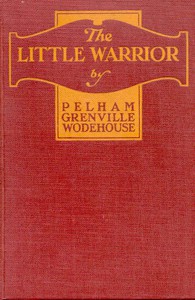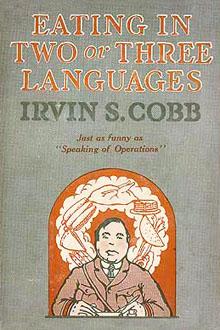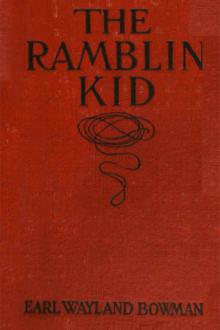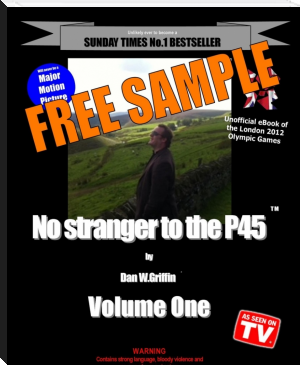The Little Warrior, P. G. Wodehouse [robert munsch read aloud txt] 📗

- Author: P. G. Wodehouse
Book online «The Little Warrior, P. G. Wodehouse [robert munsch read aloud txt] 📗». Author P. G. Wodehouse
“Charming,” began Uncle Chris in measured tones, “is an adjective which I cannot …”
“Well, thanks most awfully,” interrupted Freddie. “It’s fearfully good of you to let me bring him along. I must be staggering off now. Lot of things to do.”
“Oh, must you go already?”
“Absolutely must. Lot of things to do.”
Uncle Chris extended a hand to his hostess.
“I think I will be going along, too, Mrs Peagrim. I’ll walk a few yards with you, Freddie my boy. There are one or two things I would like to talk over. Till tonight, Mrs Peagrim.”
“Till tonight, Major Selby.” She turned to Mr Pilkington as the door closed. “What charming manners Major Selby has. So polished. A sort of old-world courtesy. So smooth!”
“Smooth,” said Mr Pilkington dourly, “is right!”
§ 2.Uncle Chris confronted Freddie sternly outside the front door.
“What does this mean? Good God, Freddie, have you no delicacy?”
“Eh?” said Freddie blankly.
“Why are you bringing Underhill to this party? Don’t you realize that poor Jill will be there? How do you suppose she will feel when she sees that blackguard again? The cad who threw her over and nearly broke her heart!”
Freddie’s jaw fell. He groped for his fallen eyeglass.
“Oh, my aunt! Do you think she will be pipped?”
“A sensitive girl like Jill!”
“But, listen. Derek wants to marry her.”
“What!”
“Oh, absolutely. That’s why he’s come over.”
Uncle Chris shook his head.
“I don’t understand this. I saw the letter myself which he wrote to her, breaking off the engagement.”
“Yes, but he’s dashed sorry about all that now. Wishes he had never been such a mug, and all that sort of thing. As a matter of fact, that’s why I shot over here in the first place. As an ambassador, don’t you know. I told Jill all about it directly I saw her, but she seemed inclined to give it a miss rather, so I cabled old Derek to pop here in person. Seemed to me, don’t you know, that Jill might be more likely to make it up and all that if she saw old Derek.”
Uncle Chris nodded, his composure restored.
“Very true. Yes, certainly, my boy, you acted most sensibly. Badly as Underhill behaved, she undoubtedly loved him. It would be the best possible thing that could happen if they could be brought together. It is my dearest wish to see Jill comfortably settled. I was half hoping that she might marry young Pilkington.”
“Good God! The Pilker!”
“He is quite a nice young fellow,” argued Uncle Chris. “None too many brains, perhaps, but Jill would supply that deficiency. Still, of course, Underhill would be much better.”
“She ought to marry someone,” said Freddie earnestly. “I mean, all rot a girl like Jill having to knock about and rough it like this.”
“You’re perfectly right.”
“Of course,” said Freddie thoughtfully, “the catch in the whole dashed business is that she’s such a bally independent sort of girl. I mean to say, it’s quite possible she may hand Derek the mitten, you know.”
“In that case, let us hope that she will look more favorably on young Pilkington.”
“Yes,” said Freddie. “Well, yes. But—well, I wouldn’t call the Pilker a very ripe sporting proposition. About sixty to one against is the way I should figure it, if I were making a book. It may be just because I’m feeling a bit pipped this morning—got turfed out of bed at seven o’clock and all that—but I have an idea that she may give both of them the old razz. May be wrong, of course.”
“Let us hope that you are, my boy,” said Uncle Chris gravely. “For in that case I should be forced into a course of action from which I confess that I shrink.”
“I don’t follow.”
“Freddie, my boy, you are a very old friend of Jill’s and I am her uncle. I feel that I can speak plainly to you. Jill is the dearest thing to me in the world. She trusted me, and I failed her. I was responsible for the loss of her money, and my one object in life is to see her by some means or other in a position equal to the one of which I deprived her. If she marries a rich man, well and good. That, provided she marries him because she is fond of him, will be the very best thing that can happen. But if she does not there is another way. It may be possible for me to marry a rich woman.”
Freddie stopped, appalled.
“Good God! You don’t mean … you aren’t thinking of marrying Mrs Peagrim!”
“I wouldn’t have mentioned names, but, as you have guessed … Yes, if the worst comes to the worst, I shall make the supreme sacrifice. Tonight will decide. Goodbye, my boy. I want to look in at my club for a few minutes. Tell Underhill that he has my best wishes.”
“I’ll bet he has!” gasped Freddie.
It is safest for the historian, if he values accuracy, to wait till a thing has happened before writing about it. Otherwise he may commit himself to statements which are not borne out by the actual facts. Mrs Peagrim, recording in advance the success of her party at the Gotham Theatre, had done this. It is true that she was a “radiant and vivacious hostess,” and it is possible, her standard not being very high, that she had “never looked more charming.” But, when, she went on to say that all present were in agreement that they had never spent a more delightful evening, she deceived the public. Uncle Chris, for one; Otis Pilkington, for another, and Freddie Rooke, for a third, were so far from spending a delightful evening that they found it hard to mask their true emotions and keep a smiling face to the world.
Otis Pilkington, indeed, found it impossible, and, ceasing to try, left early. Just twenty minutes after the proceedings had begun, he seized his coat and hat, shot out into the night, made off blindly up Broadway, and walked twice round Central Park before his feet gave out and he allowed himself to be taken back to his apartment in a taxi. He tried to tell himself that this was only what he had expected, but was able to draw no consolation from the fact. He tried to tell himself that Jill might change her mind, but hope refused to stir. Jill had been very kind and very sweet and very regretful, but it was only too manifest that on the question of becoming Mrs Otis Pilkington her mind was made up. She was willing to like him, to be a sister to him, to watch his future progress with considerable interest, but she would not marry him.
One feels sorry for Otis Pilkington in his hour of travail. This was the fifth or sixth time that this sort of thing had happened to him, and he was getting tired of it. If he could have looked into the future—five years almost to a day from that evening—and seen himself walking blushfully down the aisle of St. Thomas’ with Roland Trevis’ sister Angela on his arm, his gloom might have been lightened. More probably, however, it would have been increased. At the moment, Roland Trevis’ sister Angela was fifteen, frivolous, and freckled and, except that he rather disliked her and suspected her—correctly—of laughing at him, amounted to just nil in Mr Pilkington’s life. The idea of linking his lot with hers would have appalled him, enthusiastically though he was in favor of it five years later.
However, Mr Pilkington was unable to look into the future, so his reflections on this night of sorrow were not diverted from Jill. He thought sadly of Jill till two-thirty, when he fell asleep in his chair and dreamed of her. At seven o’clock his Japanese valet, who had been given the night off, returned home, found him, and gave him breakfast. After which, Mr Pilkington went to bed, played three games of solitaire, and slept till dinner-time, when he awoke to take up the burden of life again. He still brooded on the tragedy which had shattered him. Indeed, it was only two weeks later, when at a dance he was introduced to a red-haired girl from Detroit, that he really got over it.
The news was conveyed to Freddie Rooke by Uncle Chris. Uncle Chris, with something of the emotions of a condemned man on the scaffold waiting for a reprieve, had watched Jill and Mr Pilkington go off together into the dim solitude at the back of the orchestra chairs, and, after an all too brief interval, had observed the latter whizzing back, his every little movement having a meaning of its own—and that meaning one which convinced Uncle Chris that Freddie, in estimating Mr Pilkington as a sixty to one chance, had not erred in his judgment of form.
Uncle Chris found Freddie in one of the upper boxes, talking to Nelly Bryant. Dancing was going on down on the stage, but Freddie, though normally a young man who shook a skilful shoe, was in no mood for dancing tonight. The return to the scenes of his former triumphs and the meeting with the companions of happier days, severed from him by a two-weeks’ notice, had affected Freddie powerfully. Eyeing the happy throng below, he experienced the emotions of that Peri who, in the poem, “at the gate of Eden stood disconsolate.”
Excusing himself from Nelly and following Uncle Chris into the passage-way outside the box, he heard the other’s news listlessly. It came as no shock to Freddie. He had never thought Mr Pilkington anything to write home about, and had never supposed that Jill would accept him. He said as much. Sorry for the chap in a way, and all that, but had never imagined for an instant that he would click.
“Where is Underhill?” asked Uncle Chris, agitated.
“Derek? Oh, he isn’t here yet.”
“But why isn’t he here? I understood that you were bringing him with you.”
“That was the scheme, but it seems he had promised some people he met on the boat to go to a theatre and have a bit of supper with them afterwards. I only heard about it when I got back this morning.”
“Good God, boy! Didn’t you tell him that Jill would be here tonight?”
“Oh, rather. And he’s coming on directly he can get away from these people. Forget their name, but they’re influential coves who can do him a bit of good and all that sort of thing. The man—the head of the gang, you know—is something connected with the Cabinet or the Prime Minister or something. You’d know his name in a minute if I told you—always seeing it in the papers—they have pictures of him in Punch a lot—but I’m rotten at names. Derek did tell me, but it’s slipped the old bean. Well, he had to leg it with these people, but he’s coming on later. Ought to be here any moment now.”
Uncle Chris plucked at his mustache gloomily. Freddie’s detachment depressed him. He had looked for more animation and a greater sense of the importance of the issue.
“Well, pip-pip for the present,” said Freddie, moving toward the box. “Have to be getting back. See you later.”
He disappeared, and Uncle Chris turned slowly to descend the stairs. As he reached the floor below, the door of the stage-box opened, and Mrs Peagrim came out.
“Oh, Major Selby!” cried the radiant and vivacious hostess. “I couldn’t think where you had got to. I have been looking for you everywhere.”
Uncle Chris quivered slightly, but braced himself to do his duty.
“May I have the pleasure … ?” he began, then broke off as he saw the man who had come out of the box behind his hostess. “Underhill!” He grasped his hand and shook it warmly. “My dear fellow! I had no notion that you had arrived!”
“Sir Derek came just a moment ago,” said Mrs Peagrim.
“How are you, Major Selby?” said Derek. He was a little surprised at the warmth of his reception. He had not anticipated this geniality.
“My dear fellow, I’m delighted to see you,” cried Uncle Chris. “But, as I was saying, Mrs Peagrim, may I have the pleasure of this dance?”
“I don’t think I will dance this one,” said Mrs Peagrim surprisingly. “I’m sure you two must have ever so much to talk about. Why don’t you take Sir Derek and give him a cup of coffee?”
“Capital idea!” said Uncle Chris. “Come this way, my dear fellow. As Mrs Peagrim says, I have ever so much to talk about. Along this passage, my boy. Be careful. There’s a step. Weil, well, well! It’s delightful to see you again!” He massaged Derek’s arm affectionately. Every time he had met Mrs Peagrim that evening he had quailed inwardly at what





Comments (0)